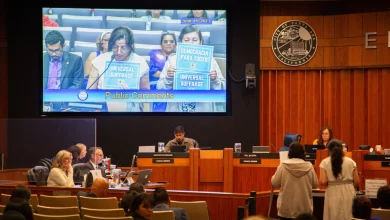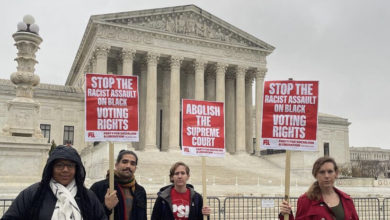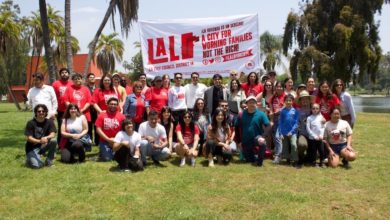There are six candidates on the presidential ballot in New York, but only two—Obama and Romney—will be allowed to participate in the Oct. 16 debate at Long Island, N.Y. Although the Party for Socialism and Liberation complied with the letter of the law, collecting over 26,000 petitions from New York voters to assure its place on the ballot, those same voters will be denied the opportunity to now hear its candidates debate.
How could this be? Rather than a fair and open public process, the debates are under the complete control of the corporate media and private institutions. They set entrance criteria that intentionally exclude third-party challengers and radical critiques.
The presidential debates are portrayed as some great democratic achievement, in which voters have a unique opportunity to compare candidates and decide for themselves who best speaks to their values. In reality, the debates are just another opportunity for the two big business parties to advertise their campaigns without facing serious criticism.
By the time voters go into the voting booth on Election Day, usually they only recognize the names of the Democratic and Republican candidates, and know nothing about what the others stand for. This is no accident—it is by design.
Commission on Presidential Debates
While the two corporate parties have long controlled national politics, in 1988 they grabbed complete control over the debate process. That year the Republicans and Democrats worked together to set up the Commission on Presidential Debates. They took over after the League of Women Voters, which previously organized the debates, refused to agree to their demands—one of which was to exclude third parties.
Through the privately run Commission on Presidential Debates, leaders of the Democratic and Republican parties set rules that require any candidate to reach 15 percent support across five national polls. This effectively excludes any other candidate, since the only way to poll so high prior to the debates would be to have already taken out tens of millions of dollars in campaign ads. Capitalist democracy comes down to money once again.
The legality of this set-up has been repeatedly challenged, but—surprise, surprise—it has been upheld by representatives of the same two parties.
Corporate media control makes mockery of ‘free elections’
The League of Women Voters explained in 1988 that “the candidates’ organizations aim to add debates to their list of campaign-trail charades devoid of substance, spontaneity and honest answers to tough questions.” How right they were. The presidential debates—like the election process generally—are focused on appearances and spin.
While some independent media outlets exist, the only media with the capacity to reach large numbers of people are dominated by a tiny handful of major corporations. Their function is to make profits for their owners and manipulate public opinion, not to inform the public.
The whole way through the electoral process, the small capitalist class effectively determines which candidates are “legitimate.” After blacking out all coverage of third-party challengers, they then conduct polls and find—to no one’s surprise—that the candidates are too “unknown” to be allowed into the debates.
The same media endlessly dissect and debate the most insignificant details of the Republican and Democratic campaigns, while the major issues of the day—growing inequality and poverty, the sprawling prison system, and the occupation of Afghanistan, for instance—never get debated.
The closed, choreographed presidential debates make a mockery of the idea of free elections, serving merely to protect the status quo.
A petition being circulated by the Party for Socialism and Liberation calls for all third-party candidates on the ballot to be allowed into the debate. It explains:
“There are many things wrong with the U.S. political system, from the enormous sums of money required to campaign, to ballot access laws that make it extremely difficult to run for office. The problem of debate access has a quick and immediate fix: The Federal Election Commission and the Commission on Presidential Debates must change their rules!”
Go to VotePSL.org to sign the petition.






